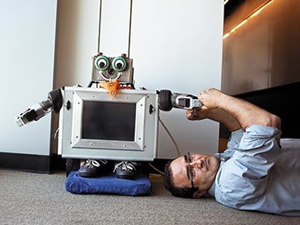Infomax: Maximizing Information Gain Across a Variety of Fields
San Diego, Calif., June 29, 2010 — You might not realize it, but every time you play a game of "20 Questions" with a friend, you're engaging in the somewhat arcane concept known as 'maximizing information gain.'
Say, for example, you begin by asking your friend if she's thinking of an animal. This eliminates vegetables and minerals from the range of possible answers and maximizes the amount of information you know for certain. You might then ask if it's a mammal and consequently eliminate birds, fish, amphibians and reptiles from your focus, and so on, until the correct answer emerges in (hopefully) 20 questions or fewer.
Researchers at the University of California, San Diego's Machine Perception (MP) Lab, which is part of the Institute for Neural Computation and is housed at the UCSD division of the California Institute of Telecommunications and Information Technology (Calit2), held a recent seminar to compare and contrast the ways that world experts from apparently disparate fields use and maximize information gain as a key concept.
|
"The goal of the seminar was to bring together people who are working on the problem of intelligent exploration, i.e., how to design systems that can explore the world on the world and gather information in an intelligent manner," explains MP Lab co-director and research scientist Javier Movellan. "We want to find common threads linking these different lines of work so as to help improve our understanding about the role of information on learning and control."
Known as "Infomax" among the roboticists in the MP lab, the term turns up under different names in a wide variety of fields, including psychologists who study how people move their eyes during visual search tasks, engineers who study how to place sensors in lakes to optimally monitor environmental conditions, roboticists who study how robots should move their heads so as to point their eyes and microphones in a manner that maximizes responsiveness to the world, and neuroscientists who study how neurons in the brain behave during learning and information gathering.
Presenters at the seminar, which was webcast in real-time, included Movellan, neuroscientists Tony Bell (UC Berkeley) and Ethan Bromberg-Martin (National Eye Institute); Professor of Psychology Bill Geisler (University of Texas, Austin); Assistant Professor of Computer Science Andreas Krause (Caltech); Professor of Computer Science and Engineering Gary Cottrell (UCSD); Assistant Professor of Cognitive Science Angela Yu (UCSD); and Professor of Biological Sciences Terry Sejnowski (UCSD), who also directs the Computational Neurobiology Laboratory at the Salk Institute.
As a roboticist, Movellan says his motivating interest in organizing the seminar was mainly scientific: He wanted to better understand how to develop robots that learn to learn on their own.
"One of the participants in the seminar, Dr. Ethan Bromberg-Martin, talked about his recent discovery of dopamine neurons that reward the brain for gathering information," he recalls. "So it turns out that the same neurons that are responsible for making people addicted to drugs such as cocaine may also be responsible for making people addicted to learning. We will be exploring these type of mechanisms that reward learning and information gathering when we start simulating sensorimotor development with our humanoid robots."
Infomax has lead to a number of existing real-world applications, notes Movellan, including the design of sensor networks to keep track of environmental conditions.
"But the key issue for the MP Lab is the development of machines that learn to learn on their own, i.e., machines that learn to gather information in an intelligent and autonomous manner. Such machines could be used for security monitoring, for intelligently gathering information on the web, for advertisement systems, and for just about any situation where efficient information gathering translates into concrete benefits.’
Movellan says that comparing and contrasting different methods for maximizing information gain led to a key insight among the seminar participants: "At a formal level," he says, "all disciplines are studying the same problem.
"Specifically,” he continues, “it is a problem in stochastic optimal control, in which the utility function is information gain. We know this is a very difficult problem for which analytical solutions exist only in very special cases of little practical interest. However in recent years we made a great deal of progress on algorithms that find approximate solutions from examples. These go under the rubric of 'reinforcement learning' or 'approximately optimal control.'"
Differences among the disciplines do exist, however, particularly in terms of how Infomax can be of use in a practical sense.
Notes Movellan: "The engineers care mostly about finding practical solutions to problems of interest. The neuroscientists care about making sense of the joint behavior of the neurons they observe. The psychologists are trying to understand why people move their eyes the way they do. So the goals are different, and the problems may be different but in all cases the formal structure of the problems these scientists are studying is the same."
Related Links
Media Contacts
Tiffany Fox, (858) 246-0353, tfox@ucsd.edu

